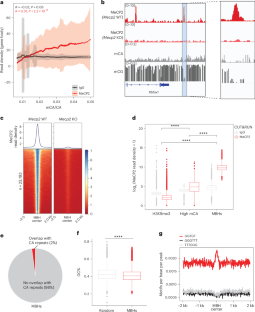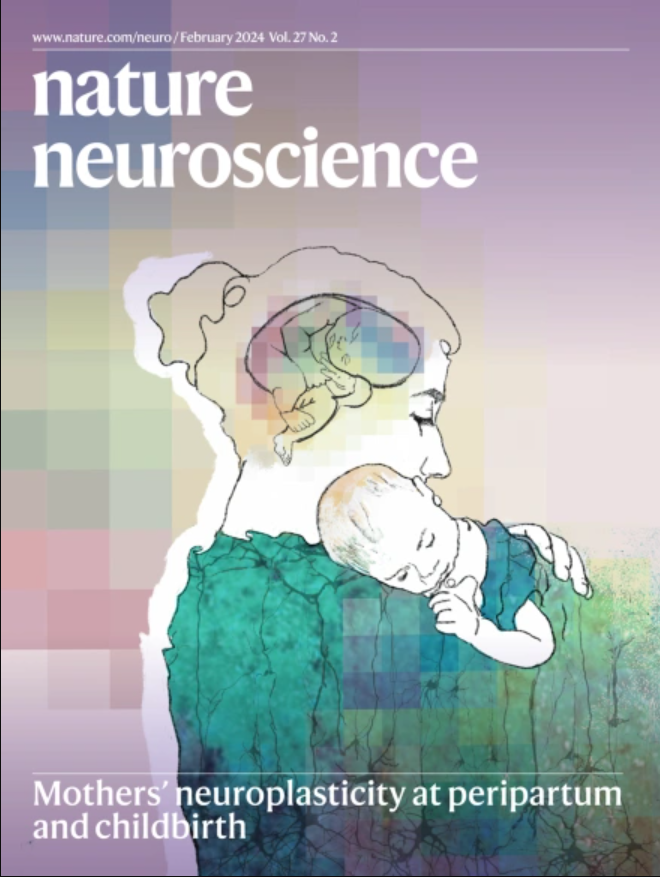Interaction of methyl-CpG-binding protein 2 (MeCP2) with distinct enhancers in the mouse cortex
IF 21.2
1区 医学
Q1 NEUROSCIENCES
引用次数: 0
Abstract
Mutations in methyl-CpG-binding protein 2 (MeCP2) cause Rett syndrome. MeCP2 is thought to regulate gene transcription by binding to methylated DNA broadly across the genome. Here, using cleavage under target and release under nuclease (CUT&RUN) assays in the adult mouse cortex, we show that MeCP2 strongly binds to specific gene enhancers that we call MeCP2-binding hotspots (MBHs). Unexpectedly, we find that MeCP2 binding to MBHs occurs in a DNA methylation-independent manner at MBHs. Multiple MBH sites surrounding genes mediate the transcriptional repression of genes enriched for neuronal functions. We show that MBHs regulate genes irrespective of genic methylation levels, suggesting that MeCP2 controls transcription via an intragenic methylation-independent mechanism. Hence, disruption of intragenic methylation-independent gene regulation by MeCP2 may in part underlie Rett syndrome. The Rett syndrome protein MeCP2 regulates gene transcription by binding to methylated DNA. Here the authors find that MeCP2 also regulates key neuronal genes by binding to nonmethylated DNA, providing new insights into the disorder.


甲基-CpG 结合蛋白 2(MeCP2)与小鼠皮层中不同增强子的相互作用
甲基-CpG结合蛋白2(MeCP2)的突变会导致Rett综合征。据认为,MeCP2 通过与基因组中广泛甲基化的 DNA 结合来调节基因转录。在这里,我们在成年小鼠皮层中使用了目标下裂解和核酸释放试验,结果表明 MeCP2 与特定的基因增强子紧密结合,我们称之为 MeCP2 结合热点(MBHs)。我们意外地发现,MeCP2 与 MBHs 的结合是以一种不依赖于 DNA 甲基化的方式发生在 MBHs 上的。基因周围的多个 MBH 位点介导了富含神经元功能的基因的转录抑制。我们发现,MBHs 对基因的调控与基因甲基化水平无关,这表明 MeCP2 通过基因内甲基化无关的机制控制转录。因此,MeCP2对基因内甲基化无关基因调控的破坏可能是Rett综合征的部分原因。
本文章由计算机程序翻译,如有差异,请以英文原文为准。
求助全文
约1分钟内获得全文
求助全文
来源期刊

Nature neuroscience
医学-神经科学
CiteScore
38.60
自引率
1.20%
发文量
212
审稿时长
1 months
期刊介绍:
Nature Neuroscience, a multidisciplinary journal, publishes papers of the utmost quality and significance across all realms of neuroscience. The editors welcome contributions spanning molecular, cellular, systems, and cognitive neuroscience, along with psychophysics, computational modeling, and nervous system disorders. While no area is off-limits, studies offering fundamental insights into nervous system function receive priority.
The journal offers high visibility to both readers and authors, fostering interdisciplinary communication and accessibility to a broad audience. It maintains high standards of copy editing and production, rigorous peer review, rapid publication, and operates independently from academic societies and other vested interests.
In addition to primary research, Nature Neuroscience features news and views, reviews, editorials, commentaries, perspectives, book reviews, and correspondence, aiming to serve as the voice of the global neuroscience community.
 求助内容:
求助内容: 应助结果提醒方式:
应助结果提醒方式:


